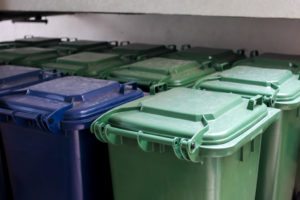 Seattle collectors will no longer be allowed to flip the lid on residential garbage cans to look for banned compostables.
Seattle collectors will no longer be allowed to flip the lid on residential garbage cans to look for banned compostables.

 Seattle collectors will no longer be allowed to flip the lid on residential garbage cans to look for banned compostables.
Seattle collectors will no longer be allowed to flip the lid on residential garbage cans to look for banned compostables.
Paper recycling hit new heights last year, according to the latest data from the American Forest & Paper Association.
A bill introduced in Ontario would implement full extended producer responsibility for paper and packaging products as the province pushes to increase diversion rates and combat climate change.
 The City of Ann Arbor, Mich. recently terminated a processing contract with ReCommunity, alleging safety concerns. But a ReCommunity executive says the municipality was just trying to get out of a deal that was no longer producing financial returns.
The City of Ann Arbor, Mich. recently terminated a processing contract with ReCommunity, alleging safety concerns. But a ReCommunity executive says the municipality was just trying to get out of a deal that was no longer producing financial returns.
 “It’s been a resounding success,” said Robert Costanzo, engineering and operations manager for Surrey, British Columbia.
“It’s been a resounding success,” said Robert Costanzo, engineering and operations manager for Surrey, British Columbia.
Two bills introduced by Rhode Island lawmakers suggest the possibility of the state putting end-of-life product management duties onto the shoulders of packaging producers.
Rhode Island legislators have introduced a bill that requires brand owners to nearly double the recycling rate for printed paper and packaging over the course of two years.
An analysis of the recycling programs of the 10 biggest cities in the U.S. shows single-stream collection is the norm – and foam polystyrene and plastic bags are being shooed away from carts.
One of America’s largest glass processors has closed its Northeast outpost.
Despite a switch to single-stream collection a year ago, St. Paul, Minnesota has seen its recycling activity remain flat. The lack of growth seems to be a factor of lightweighting trends in packaging, a lack of markets for glass and continued reliance on bins.
